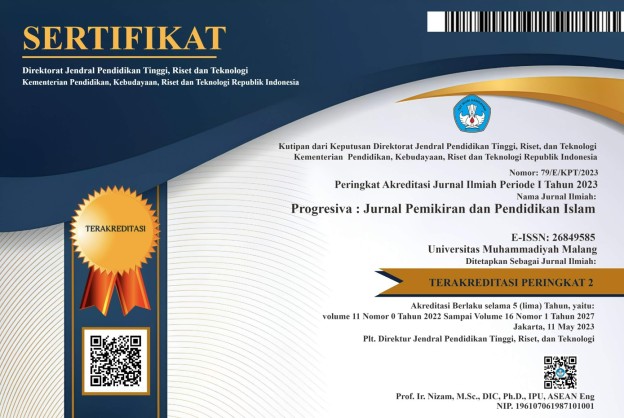Integrated Dakwah Model: How Mosques, Pesantrens, and Campuses become Islamic Preaching Centers in Bogor
DOI:
https://doi.org/10.22219/progresiva.v12i01.27704Keywords:
Dawah Model, Integration, Masjid, PesantrenAbstract
This research is qualitative research on the dakwah model of integration of mosques, pesantrens and campuses in Bogor. The approach used in the research is sociological, which is explored through field studies. Primary data in the study were obtained directly from the field both from field observations and interviews with the management of Al Hijri II Mosque, PPMS Ulil Albab, Ibn Khaldun University, Baitul Hamdi Mosque, Bina Tawhid Islamic Boarding School and Djuanda University. The secondary data is obtained from data that have been collected in the form of documents, or writings that have been available, both on the web, in magazines and in other means of media related to Masjid Al Hijri II, PPMS Ulil Albab, Ibn Khaldun University, Baitul Hamdi Mosque, Bina Tawhid Islamic Boarding School, Djuanda University. The purpose of this study was to find a dakwah model for the integration of mosques, pesantrens and campuses in Bogor. The findings of this study are as follows: The dakwah model for the integration of mosques, pesantrens and campuses in Bogor is the Six I Dakwah Model. The Six I Dakwah model includes six essential elements, namely: Preacher integration, mad’u integration, integration of the content for the dakwah, dakwah collaboration, integration of mosque environment areas, pesantrens and campuses, and islamization of campus facilities.
Downloads
References
Abdullah Kamal, S. S. L. B. (2019). Research Paradigm and the Philosophical Foundations of a Qualitative Study. PEOPLE: International Journal of Social Sciences, 4(3), 1386–1394. https://doi.org/10.20319/pijss.2019.43.13861394
Abidin, M. (2012). Gagasan dan Gerak Dakwah Mohammad Natsir: Hidupkan Dakwah Bangun Negeri. Gre Publishing.
Alim, A. (2012a). Islamisasi Hukum. Pustaka Al Bustan.
Alim, A. (2012b). Islamisasi Ilmu Pendidikan. Pustaka Al Bustan.
Alim, A. (2012c). Islamisasi Sains dan Teknologi. Pustaka Al Bustan.
Alim, A. (2014). Studi Islam Islamisasi Ilmu Kesehatan. Pustaka Al Bustan.
Alim, A. (2016). Islamisasi Kesehatan. PUSKI UIKA.
Alim, A. (2023). Hasil Wawancara , 16 Mei 2023. 13:00 WIB.
Amura. (1991, April). Dakwah Menghadapi Tantangan Kemajuan Dan Teknologi. Media Dakwah.
Arifin, Z., Artanto, D., & Rahman, A. (2023). Digital Marketing: Marketing Strategy for Madrasah Education Services During The Covid-19 Pandemic. Al Tanzim, 7(1), 1–10.
Aswar, H. (2021). The Strategy of Muslim Communities in Encountering Islamophobia in The United States. Afkaruna: Indonesian Interdisciplinary Journal of Islamic Studies, 17(1). https://doi.org/10.18196/afkaruna.v17i1.11468
Baz, A. A. A. Bin, Utsaimin, M. B. S. Al, & Syaikh, S. B. A. A. A. A. A. (2006). Majmu’ Durus Wa Rasail Fi Dakwah Ila Allah. Dar Ibn al Jauzy.
Budi Handrianto. (2019). Islamisasi Ilmu Pengetahuan Di Era Revolusi Industri 4.0 (Makna Dan Tantangannya). Annual Conference on Islamic Education and Social Sains (ACIEDSS 2019), 1(1), 1–13.
Celyna Isnaeni Septia Puspa, & Sundawa, D. (2023). Implementing Problem-Based Learning Models In Social Studies To Improving Students Moral Character. QALAMUNA, 15(1), 49–60.
Dhofier, Z. (1985). Tradisi Pesantren, cet 4. Lp3es.
Djamaluddin, M. A. (2003). Capita Selekta Aliran Sesat di Indonesia. YLPPI.
Djamaluddin, M. A. (2018). Kesesatan Shalawat Wahidiyah. LPPI.
Djamaluddin, M. A. (2021). Mirza Ghulam Ahmad Nabinya Ahmadiyah Pembohong, Mata Kranjang dan Mata Duitan. LPPI.
Fauziyah, S. P., & Roestamy, M. (2020). Pendidikan Karakter Berbasis Tauhid, cet I. Rajawali Press.
Hafidhuddin, D. (2006). Agar Layar Tetap Terkembang: Upaya Menyelamatkan Umat. Gema Insani.
Hafidhuddin, D. (2021). Membangun Kemandirian Umat. UIKA Press.
Husaini, A. (2020). Perguruan Tinggi Ideal Di Era Distrubsi. Yayasan Pendidikan Islam At Taqwa.
Husaini, A. (2022). Beginilah Pendidikan Nasional Yang Ideal. Yayasan Pendidikan Islam At Taqwa.
Kemendagri. (n.d.). Jumlah Kampus di Bogor.
Malim, M., & Sholihin, A. (2010). Dinamika Dan Strategi Dakwah. Media Dakwah.
Mamdani, M. (2002). Good Muslim, Bad Muslim: A Political Perspective on Culture and Terrorism. American Anthropologist, 104(3), 766–775. https://doi.org/https://doi.org/10.1525/aa.2002.104.3.766
Moleong, L. J. (2004). Metodologi Penelitian Kualitatif, Edisi revisi. Remaja Rosdakarya.
Moleong, L. J. (2018). Penelitian Kualitatif: Edisi Revisi. Remaja Rosdakarya.
Mukhlis, F. (2020). Sunan Drajat’s Influences to Islamic Education: 15th Century. Progresiva : Jurnal Pemikiran Dan Pendidikan Islam, 8(2), 97. https://doi.org/10.22219/progresiva.v8i2.11038
Mukhlis, F., Yusuf, Z., Wachid, M. S., & Fiadha, A. A. (2023). PENDAMPINGAN LITERASI DIGITAL DAN DAKWAH. Jurnal Aplikasi Dan Inovasi IPTEKS SOLIDITAS, 6, 172–182.
Muthohirin, N., & Suherman, S. (2020). Resiliensi Pesantren Terhadap Ekstrimisme Kekerasan Berbasiskan Agama dan Implikasinya terhadap Masyarakat Pesisir Lamongan. J-PAI: Jurnal Pendidikan Agama Islam, 7(1), 46–60. https://doi.org/10.18860/jpai.v7i1.11887
Najib, M. A. (2018). Epistimologi Tasawuf Modern Hamka. Jurnal Dinamika Penelitian: Media Komunikasi Sosial Keagamaan, 18(2), 303–324.
Nasution, M. E., & Usma, H. (2008). Proses penelitian kuantitatif, Cet.3. Lembaga Penerbit Fakultas Ekonomi UI.
Natsir, M. (2008). Fiqhud Da’wah, cet. XIII. Media Da’wah.
Profil Ulil Albaab. (2023).
Profil UNIDA Bogor. (2023).
Rahmawati, F. (2018). Kecenderungan Pergeseran Pendidikan Agama Islam di Indonesia Pada Era Disrupsi. TADRIS: Jurnal Pendidikan Islam, 13(2). https://doi.org/10.19105/tjpi.v13i2.1752
Rahmawaty, A. (2016). Model Kepemimpinan Spiritual dalam Meningkatkan Kepuasan Kerja dan Kinerja Karyawan di BMT Se-Kabupaten Pati. Iqtishadia: Jurnal Kajian Ekonomi Dan Bisnis Islam STAIN Kudus, 9(2), 276–303.
Ramadan, T. (2009). Radical Reform, Islamic Ethics and Liberation. Oxford University Press.
Rehman, A. A., & Alharthi, K. (2016). An introduction to research paradigms. International. Journal of Educational Investigations, 3(8), 51–59. https://www.researchgate.net/publication/325022648
Rȏwi, M. A. (1962). Ad Dakwah Al Islamiyyah. Dâr Al ‘Arabiyyah.
Sa’adi. (2021). Countering Islamophobia in Portugal: Experience of Indonesian Muslim expatriates. Indonesian Journal of Islam and Muslim Societies, 11(1), 29–53. https://doi.org/10.18326/IJIMS.V11I1.29-53
Saefuddin, A. (2010). Islamisasi sains dan kampus. PT PPA Consultants.
Saefuddin, A. (2016). Membangun Pesantren Modern: Peran Mahasantri dalam Pembaharuan Pendidikan. Gema Insani Press.
Santoso, T., Fauziati, E., Afianto, D., Purnomo, E., & Dartim. (2020). Islam wasathiyah (Islamic moderitism) in the Muhammadiyah Khittah Document. Palarch’s Journal Of Archaeology Of Egypt/Egyptology, 17(7), 3512–3531.
Sanusi, S. (1967). Integrasi Ummat Beragama, cet 1. Pendidikan Tinggi Dakwah Islam.
Shȏwi, A. Al. (2005). Manhaj Syeikh Ibn Utsaimin Fi Al Da’wah Ila Allah. Maktab Ibn Abbas.
Sugiyono. (2008). Metode Penelitian Pendidikan-Pendekatan Kuantitatif, Kualitatif, dan R&D, cet. 5. Alfabeta.
Suhetang, S. (2023). Hasil Wawancara 8 Mei 2023, 17:00 WIB.
Sutarna, N. (2019). Strengthening character education based on Islam for millennial generation in digital era. Proceeding IAIN Batusangkar. https://ojs.iainbatusangkar.ac.id/ojs/index.php/proceedings/article/view/1311
Tahir, M. (2023). Effective Da’wah (Proselytizing) in the Era of Society 5.0: The Perspective of Students in Indonesian State Islamic Higher Education. Risalah, 34(1), 52–71.
Tim Penulis Mui Pusat. (2013). Mengenal dan mewaspadai penyimpangan syi’ah di Indonesia. As Sunnah.
Downloads
Published
How to Cite
Issue
Section
License
Copyright (c) 2023 Muhammad Hanif, Abdul Hamid, Agusman Agusman, Siti Nurhaidah

This work is licensed under a Creative Commons Attribution-ShareAlike 4.0 International License.


















